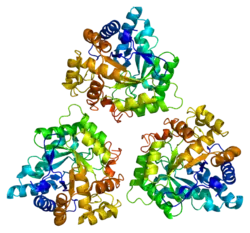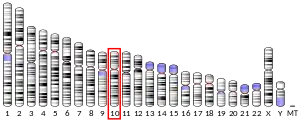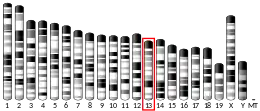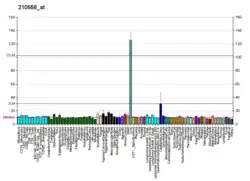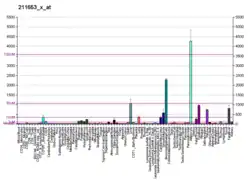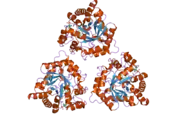3α-Hydroxysteroid dehydrogenase (3α-HSD or aldo-keto reductase family 1 member C4) is an enzyme that in humans is encoded by the AKR1C4 gene.[5][6] It is known to be necessary for the synthesis of the endogenous neurosteroids allopregnanolone, THDOC, and 3α-androstanediol. It is also known to catalyze the reversible conversion of 3α-androstanediol (5α-androstane-3α,17β-diol) to dihydrotestosterone (DHT, 5α-androstan-17β-ol-3-one) and vice versa.[7]
Function
This gene encodes a member of the aldo/keto reductase superfamily, which consists of more than 40 known enzymes and proteins. These enzymes catalyze the conversion of aldehydes and ketones to their corresponding alcohols by utilizing NADH and/or NADPH as cofactors. The enzymes display overlapping but distinct substrate specificity. This enzyme catalyzes the bioreduction of chlordecone, a toxic organochlorine pesticide, to chlordecone alcohol in liver. This gene shares high sequence identity with three other gene members and is clustered with those three genes at 10p15-p14 on chromosome 10.[6]
Clinical significance
Various antidepressants, including the SSRIs fluoxetine, fluvoxamine, sertraline, and paroxetine, the SNRI venlafaxine, and mirtazapine, have been found to activate certain 3α-HSD enzymes, resulting in a selective facilitation of 5α-dihydroprogesterone conversion into allopregnanolone. This action has been implicated in their effectiveness in affective disorders, and has resulted in them being described as selective brain steroidogenic stimulants (SBSSs).[8][9][10]
See also
References
- 1 2 3 GRCh38: Ensembl release 89: ENSG00000198610 - Ensembl, May 2017
- 1 2 3 GRCm38: Ensembl release 89: ENSMUSG00000021210 - Ensembl, May 2017
- ↑ "Human PubMed Reference:". National Center for Biotechnology Information, U.S. National Library of Medicine.
- ↑ "Mouse PubMed Reference:". National Center for Biotechnology Information, U.S. National Library of Medicine.
- ↑ Khanna M, Qin KN, Klisak I, Belkin S, Sparkes RS, Cheng KC (January 1995). "Localization of multiple human dihydrodiol dehydrogenase (DDH1 and DDH2) and chlordecone reductase (CHDR) genes in chromosome 10 by the polymerase chain reaction and fluorescence in situ hybridization". Genomics. 25 (2): 588–90. doi:10.1016/0888-7543(95)80066-U. PMID 7789999.
- 1 2 "Entrez Gene: AKR1C4 aldo-keto reductase family 1, member C4 (chlordecone reductase; 3-alpha hydroxysteroid dehydrogenase, type I; dihydrodiol dehydrogenase 4)".
- ↑ Rizner TL, Lin HK, Peehl DM, Steckelbroeck S, Bauman DR, Penning TM (July 2003). "Human type 3 3alpha-hydroxysteroid dehydrogenase (aldo-keto reductase 1C2) and androgen metabolism in prostate cells". Endocrinology. 144 (7): 2922–32. doi:10.1210/en.2002-0032. PMID 12810547.
- ↑ Griffin LD, Mellon SH (November 1999). "Selective serotonin reuptake inhibitors directly alter activity of neurosteroidogenic enzymes". Proceedings of the National Academy of Sciences of the United States of America. 96 (23): 13512–7. Bibcode:1999PNAS...9613512G. doi:10.1073/pnas.96.23.13512. PMC 23979. PMID 10557352.
- ↑ Pinna G (September 2010). "In a mouse model relevant for post-traumatic stress disorder, selective brain steroidogenic stimulants (SBSS) improve behavioral deficits by normalizing allopregnanolone biosynthesis". Behavioural Pharmacology. 21 (5–6): 438–50. doi:10.1097/FBP.0b013e32833d8ba0. PMC 2942072. PMID 20716970.
- ↑ Schüle C, Romeo E, Uzunov DP, Eser D, di Michele F, Baghai TC, Pasini A, Schwarz M, Kempter H, Rupprecht R (March 2006). "Influence of mirtazapine on plasma concentrations of neuroactive steroids in major depression and on 3alpha-hydroxysteroid dehydrogenase activity". Molecular Psychiatry. 11 (3): 261–72. doi:10.1038/sj.mp.4001782. PMID 16344854. S2CID 21473462.
External links
- Human AKR1C4 genome location and AKR1C4 gene details page in the UCSC Genome Browser.
Further reading
- Binstock JM, Iyer RB, Hamby CV, Fried VA, Schwartz IS, Weinstein BI, Southren AL (September 1992). "Human hepatic 3 alpha-hydroxysteroid dehydrogenase: possible identity with human hepatic chlordecone reductase". Biochemical and Biophysical Research Communications. 187 (2): 760–6. doi:10.1016/0006-291X(92)91260-W. PMID 1530633.
- Winters CJ, Molowa DT, Guzelian PS (January 1990). "Isolation and characterization of cloned cDNAs encoding human liver chlordecone reductase". Biochemistry. 29 (4): 1080–7. doi:10.1021/bi00456a034. PMID 2187532.
- Khanna M, Qin KN, Cheng KC (June 1995). "Distribution of 3 alpha-hydroxysteroid dehydrogenase in rat brain and molecular cloning of multiple cDNAs encoding structurally related proteins in humans". The Journal of Steroid Biochemistry and Molecular Biology. 53 (1–6): 41–6. doi:10.1016/0960-0760(95)00019-V. PMID 7626489. S2CID 11316547.
- Khanna M, Qin KN, Wang RW, Cheng KC (August 1995). "Substrate specificity, gene structure, and tissue-specific distribution of multiple human 3 alpha-hydroxysteroid dehydrogenases". The Journal of Biological Chemistry. 270 (34): 20162–8. doi:10.1074/jbc.270.34.20162. PMID 7650035.
- Deyashiki Y, Ogasawara A, Nakayama T, Nakanishi M, Miyabe Y, Sato K, Hara A (April 1994). "Molecular cloning of two human liver 3 alpha-hydroxysteroid/dihydrodiol dehydrogenase isoenzymes that are identical with chlordecone reductase and bile-acid binder". The Biochemical Journal. 299 ( Pt 2) (2): 545–52. doi:10.1042/bj2990545. PMC 1138306. PMID 8172617.
- Qin KN, New MI, Cheng KC (December 1993). "Molecular cloning of multiple cDNAs encoding human enzymes structurally related to 3 alpha-hydroxysteroid dehydrogenase". The Journal of Steroid Biochemistry and Molecular Biology. 46 (6): 673–9. doi:10.1016/0960-0760(93)90308-J. PMID 8274401. S2CID 36210133.
- Kume T, Iwasa H, Shiraishi H, Yokoi T, Nagashima K, Otsuka M, Terada T, Takagi T, Hara A, Kamataki T (December 1999). "Characterization of a novel variant (S145C/L311V) of 3alpha-hydroxysteroid/dihydrodiol dehydrogenase in human liver". Pharmacogenetics. 9 (6): 763–71. doi:10.1097/00008571-199912000-00011. PMID 10634139.
- Nishizawa M, Nakajima T, Yasuda K, Kanzaki H, Sasaguri Y, Watanabe K, Ito S (February 2000). "Close kinship of human 20alpha-hydroxysteroid dehydrogenase gene with three aldo-keto reductase genes". Genes to Cells. 5 (2): 111–25. doi:10.1046/j.1365-2443.2000.00310.x. PMID 10672042. S2CID 25136637.
- Dufort I, Labrie F, Luu-The V (February 2001). "Human types 1 and 3 3 alpha-hydroxysteroid dehydrogenases: differential lability and tissue distribution". The Journal of Clinical Endocrinology and Metabolism. 86 (2): 841–6. doi:10.1210/jcem.86.2.7216. PMID 11158055.
- Ozeki T, Takahashi Y, Kume T, Nakayama K, Yokoi T, Nunoya K, Hara A, Kamataki T (April 2001). "Co-operative regulation of the transcription of human dihydrodiol dehydrogenase (DD)4/aldo-keto reductase (AKR)1C4 gene by hepatocyte nuclear factor (HNF)-4alpha/gamma and HNF-1alpha". The Biochemical Journal. 355 (Pt 2): 537–44. doi:10.1042/0264-6021:3550537. PMC 1221767. PMID 11284743.
- Ozeki T, Takahashi Y, Nakayama K, Kamataki T (September 2002). "Hepatocyte nuclear factor (HNF)-4 alpha/gamma, HNF-1 alpha, and vHNF-1 regulate the cell-specific expression of the human dihydrodiol dehydrogenase (DD)4/AKR1C4 gene". Archives of Biochemistry and Biophysics. 405 (2): 185–90. doi:10.1016/S0003-9861(02)00384-3. PMID 12220531.
- Ozeki T, Takahashi Y, Nakayama K, Funayama M, Nagashima K, Kodama T, Kamataki T (January 2003). "Hepatocyte nuclear factor-4 alpha/gamma and hepatocyte nuclear factor-1 alpha as causal factors of interindividual difference in the expression of human dihydrodiol dehydrogenase 4 mRNA in human livers". Pharmacogenetics. 13 (1): 49–53. doi:10.1097/00008571-200301000-00007. PMID 12544512.
- Schüle C, Romeo E, Uzunov DP, Eser D, di Michele F, Baghai TC, Pasini A, Schwarz M, Kempter H, Rupprecht R (March 2006). "Influence of mirtazapine on plasma concentrations of neuroactive steroids in major depression and on 3alpha-hydroxysteroid dehydrogenase activity". Molecular Psychiatry. 11 (3): 261–72. doi:10.1038/sj.mp.4001782. PMID 16344854. S2CID 21473462.
